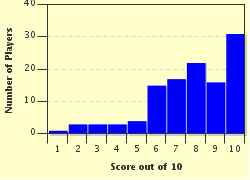Quiz Answer Key and Fun Facts
1. The Athens daily newspaper, "Athens Daily News", had this headline in 490 BC: "Our gallant troops inflict heavy losses on the invading Persians". What was the name of the place that this battle was fought?
2. The "Sparta Herald" carried this headline in 480 BC: "Our lionhearted king Leonidas dies in a fierce battle against the Persians". Where did this battle take place?
3. In 411 BC the "Athens Evening News" ran the following headline: "Anti-war comedy Lysistrata received enthusiastically". Who was the author of this comedy?
4. In 401 BC the "Athens Crier" ran the following headline: "Young Athenian produces his late grandfather's work Oedipus at Colonus". Who was the author of the play?
5. The Athens daily newspaper, "Athens Express", had this headline in 429 BC: "Our glorious leader succumbs to the plague". Who was this person?
6. The Athens daily newspaper, "Athens Crier", had this headline in 399 BC: "Famous philosopher dies by drinking hemlock". Who was this person?
7. In July 371 BC this headline appeared in a local newspaper: "Under the leadership of Epaminondas and Pelopidas the Spartans are dealt a crushing blow". Which city's newspaper could have carried this headline?
8. In October 336 BC the "Macedon Bugle" carried the following headline: "Our king is assassinated during his daughter's wedding ceremony". Who was this king?
9. In May 334 BC the "Macedon Reporter" carried the following headline: "Our young king Alexander defeats superior Persian forces near Troy". To which battle does the headline refer?
10. The daily newspaper, "Syracuse Express", run this headline in 212 BC "Brilliant scientist slain by Roman soldier". Who was this person?
Source: Author
gme24
This quiz was reviewed by FunTrivia editor
bloomsby before going online.
Any errors found in FunTrivia content are routinely corrected through our feedback system.


